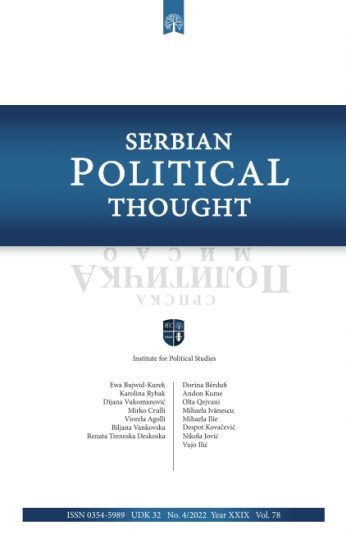Main topic
spt2/2015
Demokratie im Stillstand: die geminderte Einflusskraft der Europäischen Union auf Demokratisierungsprozesse
Abstract
Die Krise der EU hat ihre Kapazität als Demokratieförderer ziemlich reduziert. Die Politik der EU ist auf die Struktur – und Wirtschaftsprobleme fokussiert, und die Demokratieförderung bleibt im Hintergrund. Der EU ist es wichtig, das für ihre Funktionsfähigkeit notwendige Zusammenhalten der Mitgliedstaaten zu sichern, und sie weigert sich, sich bei Abweichungen von den demokratischen Standards in den Mitgliedstaten einzumischen. Viel wichtiger erscheint jedoch die Tatsache, dass die EU ihr Interesse an der Demokratieförderung in den Nichtmitgliedstaaten verloren hat. Das Einflusspotenzial der EU-Erweiterungspolitik, die als zentraler Außenfaktor in der Demokratisierung der Staaten Mittel- und Osteuropa fungiert hat, ist durch die Ungewissheit einer nächsten Erweiterung erheblich geschwächt worden. Die Demokratisierungseffekte der EU-Nachbarschaftspolitik sind noch bescheidener, und sie deuten die Unfähigkeit der EU an, mit den Krisen in den östlichen (etwa der Ukraine) und südlichen (etwa Ägypten, Lybien oder Syrien) Nachbarn umzugehen.
References
- Asemoglu, D., Robinson, Dž. A. (2014) Zašto narodi propadaju. Poreklo moći, prosperiteta i siromaštva. Beograd: Clio.
- Budo, G. (2014) “EU Common Values at Stake: Is Article 7 TEU an Effective Protection Mechanism”,in: Documents CIDOB [online] http://www.cidob.org/en/publications/publication_series/documents_cidob_new_era/eu_common_values_at_stake_is_article_7_teu_an_effective_protection_mechanism (abberufen am 9. September 2015).
- Callies, C. (2011) „Art. 2 EUV“. In: Callies, C., Ruffert, M. (Hrsg.) „EUV/AEUV. Das Verfassungsrecht der Europäischen Union mit Europäischer Grundrechtecharta. Kommentar“, München: C.H. Beck, S. 29-41.
- Carothers, T. (2015) “Democracy Aid at 25: Time to Choose”, in: Journal of Democracy, 26, (1): 59-73.
- Cooley, A. (2015) “Countering Democratic Norms”, in: Journal of Democracy, 26(3): 49-63.
- Diamond, L. (2015) “Facing up to the Democratic Recession”, in: Journal of Democracy, 26, (1): 141-155.
- Freedom House (2015) “Nations in Transit 2015: Bulgaria”. [online] abrufbar unter https://freedomhouse.org/report/nations-transit/2015/bulgaria (abberufen am 9. September 2015).
- Freedom House (2015) “Nations in Transit 2015: Romania”. [online] abrufbar unter https://freedomhouse.org/report/nations-transit/2015/romania (abberufen am 9. September 2015).
- Freedom House (2015) “Nations in Transit 2015: Croatia”. [online] abrufbar unter https://freedomhouse.org/report/nations-transit/2015/croatia (abberufen am 9. September 2015).
- Freedom House (2015) “Nations in Transit 2015: Hungary”. [online] abrufbar unter https://freedomhouse.org/report/nations-transit/2015/hungary (abberufen am 9. September 2015).
- Freedom House (2015) “Nations in Transit 2015: Albania” [online] abrufbar unter https://freedomhouse.org/report/nations-transit/2015/albania (abberufen am 10. September 2015).
- Freedom House (2015) “Nations in Transit 2015: Montenegro” [online] abrufbar unter https://freedomhouse.org/report/nations-transit/2015/montenegro (abberufen am 10. September2015).
- Freedom House (2015) “Nations in Transit 2015: Georgia” [online] abrufbar unter https://freedomhouse.org/report/nations-transit/2015/georgia (aberufen am 10. September 2015).
- Freedom House (2015) “Freedom in the World: Turkey” [online] abrufbar unter https://freedomhouse.org/report/freedom-world/2015/turkey (abberufen am 10. September2015).
- Freedom House (2015) “Freedom in the World: Tunisia” [online] abrufbar unter https://freedomhouse.org/report/freedom-world/2015/tunisia (aberufen am 10. September 2015).
- Fukuyama, F. (2015) “Why is Democracy Performing so Poorly”, in: Journal of Democracy, 26(1): 11-20.
- Grabbe, H. (2006) The EU’s Transformative Power. Europeanization through Conditionality in Central and Eastern Europe, Hampshire: Palgrave Macmillan.
- Kagan, R. (2015) “The Weight of Geopolitics”, in: Journal of Democracy, 26(1): 21-32.
- Levitsky, S., Way, L. (2015) “The Myth of Democratic Recession”, in: Journal of Democracy, 26(1): 45-59.
- Mungiu-Pippidi, A. (2014) “The Transformative Power of Europe Revisted”, in: Journal of Democracy, 25(1): 20-32.
- Müller,-W. (2013) “Defending Democracy within the EU”, in: Journal of Democracy, 24(2): 138-149.
- Puddington, A. (2015) “A Return to the Iron Fist. The Freedom House Survey for 2014”, in: Journal of Democracy, 26(2): 122-138.
- Ruffert, M. (2011) „Art. 7 EUV“. In: Callies, C., Ruffert, M. (Hrsg.) „EUV/AEUV: Das Verfassungsrecht der Europäischen Union mit Europäischer Grundrechtecharta. Kommentar“, München: Verlag C. H. Beck, S. 153-162.
- Rupnik, J. (2010) “In Search of a New Model”, in: Journal of Democracy, 21(1): 105-112.
- Schmitter, P. C. (2010) “Twenty-five Years, Fifteen Findings”, in: Journal of Democracy, 21(1): 17-28.
- Schmitter, P. C. (2012) “A Way Forward”, in: Journal of Democracy, 23(4): 39-46.
- Schmitter, P. C. (2015) “Crisis and Transition, but not Decline”, in: Journal of Democracy, 26(1): 32-44.
- Venice Commission (2012) “Opinion the Compatibility with Constitutional Principles and the Rule of Law of Actions taken by the Government ant the Parliament of Romania in Respect of other State Institutions and on the Government Emergency Ordinance on Amendment to the Law No. 47/1992 regarding the Organisation and Functioning of the Constitutional Court and on the Government Emergency Ordinance on Amending and Completing the Law No. 3/2000 regarding the Organisation of a Referendum”, Opinion no. 685/2012. [online] abrufbar unter http://www.venice.coe.int/webforms/documents/CDL-AD%282012%29026-e.aspx (abberufen am 9. September 2015).
- Von Bogdandy, A., Schill, S. (2011) “Overcoming Absolute Primacy: Respecting for National Identity under the Lisbon Treaty”, in: Common Market Law Review, 48: 1-38.

